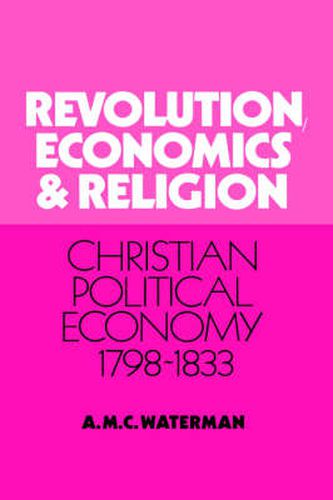Readings Newsletter
Become a Readings Member to make your shopping experience even easier.
Sign in or sign up for free!
You’re not far away from qualifying for FREE standard shipping within Australia
You’ve qualified for FREE standard shipping within Australia
The cart is loading…






Malthus’s Essay on Population was seen in 1798 as a complete refutation of Godwin and all ‘Jacobin’ ideology. It proved that a state of equality and justice for all was unfeasible; and it demonstrated the inevitability and beneficence of private property and political institutions. But its central theme, the dominance of scarcity in human affairs, presented the theological ‘problem of evil’ in novel and threatening form. For thirty-five years both the economics and the theology of the Essay were modified and refined: first by Paley, Sumner and Malthus himself, and later by Copleston, Whately and Chalmers. The result was ‘Christian Political Economy’: an ideological alliance of political economy and Christian theology, congenial to a new ‘liberal-conservatism’ in the early nineteenth century, which found middle ground between the ultra-tory defence of the ancien regime and a ‘radical’ repudiation of existing institutions, Thanks to Whately’s demarcation of ‘scientific’ from ‘theological’ knowledge, Christian Political Economy was able to beat off the Benthamite challenge of ‘Philosophic Radicalism’ and to remain ideologically dominant for most of the nineteenth century. As an unintended outcome of all this ideological polemic, there emerged certain ideas now recognized as fundamental to economic science. Professor Waterman analyses this story of the ‘intellectual repulse of revolution’, and describes the ideological alliance of political economy and Christian theology after 1798. In doing so, he supplies the missing piece of the jigsaw puzzle of English intellectual history, and offers the first clear analysis of the axial period between the 1790s and 1832.
$9.00 standard shipping within Australia
FREE standard shipping within Australia for orders over $100.00
Express & International shipping calculated at checkout
Malthus’s Essay on Population was seen in 1798 as a complete refutation of Godwin and all ‘Jacobin’ ideology. It proved that a state of equality and justice for all was unfeasible; and it demonstrated the inevitability and beneficence of private property and political institutions. But its central theme, the dominance of scarcity in human affairs, presented the theological ‘problem of evil’ in novel and threatening form. For thirty-five years both the economics and the theology of the Essay were modified and refined: first by Paley, Sumner and Malthus himself, and later by Copleston, Whately and Chalmers. The result was ‘Christian Political Economy’: an ideological alliance of political economy and Christian theology, congenial to a new ‘liberal-conservatism’ in the early nineteenth century, which found middle ground between the ultra-tory defence of the ancien regime and a ‘radical’ repudiation of existing institutions, Thanks to Whately’s demarcation of ‘scientific’ from ‘theological’ knowledge, Christian Political Economy was able to beat off the Benthamite challenge of ‘Philosophic Radicalism’ and to remain ideologically dominant for most of the nineteenth century. As an unintended outcome of all this ideological polemic, there emerged certain ideas now recognized as fundamental to economic science. Professor Waterman analyses this story of the ‘intellectual repulse of revolution’, and describes the ideological alliance of political economy and Christian theology after 1798. In doing so, he supplies the missing piece of the jigsaw puzzle of English intellectual history, and offers the first clear analysis of the axial period between the 1790s and 1832.